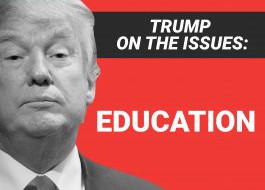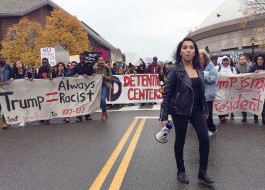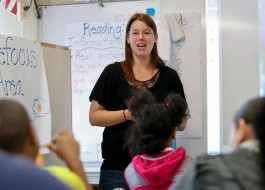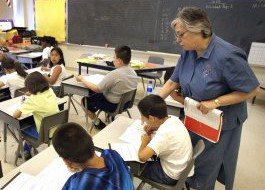 Talking politics with children is hard.Getty Images / Robert Benson
Talking politics with children is hard.Getty Images / Robert Benson
Just days after Donald Trump won the presidential election, people around the country took to social media to document instances of bullying and harassment that sprang up in American schools.
Parents posted on Facebook about the verbal and physical abuse their children suffered. Students recorded videos of white power demonstrations in the halls.
Through all of this, educators have been the ones expected to find teachable moments, handle insensitivity with grace, and remind their students how members of a civil society ought to treat one another.
Business Insider spoke with three such teachers. Each teaches a different subject, at a different grade level, and in a different part of the US. They shared their fears about teaching in a Trump America and how they plan to confront the intolerance that many people fear the election has legitimized.
Allan DeCarlo, 52, 11th & 12th grade history and government in upstate New York
The morning after Trump was declared president-elect, DeCarlo was not looking forward to going to school. Many of his students in Pittsford, a suburb of Rochester, were Hillary supporters, so he knew they'd take the results hard.
"I found kids in tears, and more than anything else my reassurance came in the form of a hug," DeCarlo tells Business Insider. He compares the somber mood to the one following the attacks on September 11th.
For that reason, DeCarlo says his biggest fear is that his students will no longer feel safe and protected at school. Shortly after the election, he said several gay and Muslim students came to him asking to be excused from the school's planned field trip to Washington DC for Inauguration Day. He tried to assure them that he would stand near them at all times and make sure nothing bad happened.
"Our job is going to be to help kids heal through this," he says. "I'm going to have to assure them that we still have people who will look out for their best interest."
Angel Corral, 28, 10th & 11th grade science in Oakland, California
Roughly 80% of the 250 students at Corral's school are Latino, and about a dozen are undocumented, she says. Trump's promises of deportation have her worried about how to talk to kids whose families could get taken from their homes, especially as many students — some of whom are the first in their family to attend high school — begin to prepare for college.
"As a teacher, I need to be able to create a container than can hold my students' emotions," she tells Business Insider. "But the next steps after that are not so clear to me."
Corral says the school has been diligent about giving students a safe space to share their feelings, and even brought in psychology students from nearby UC Berkeley to help kids cope. As for the social-media posts documenting hate crimes, however, she's just happy that hasn't happened to any of her students.
"Luckily, we have a pretty diverse student population and have built this empathy with each other," she says.
Diana*, 27, 2nd grade in southern Missouri
*Because the town where she works is very small, the teacher we are calling Diana did not want to share her real name or the name of the town.
The world is small for many people in Diana's community. Lots of her students go to the same Baptist or Christian church. There are no stoplights in the whole town. Everyone is white.
When Trump won the election, Diana says she was devastated. Personally, she'd hoped for a different outcome, but doubly so for her students. "I have heard, 'My mom says if you believe in Obama you are not a Christian,'" Diana says. "I hear a lot of derogatory, bullying, sexist, racist comments from my students while reading a multi-cultural book or simply playing at recess when pretend playing."
She knows the kids are parroting what they hear, and says she feels an enormous pressure to open their eyes to the world beyond their home town. With Trump as president, she worries her kids won't be exposed to many new ideas.
"My biggest fear for my students is getting caught up in the cycle of living and breathing only in this rural community," she says. "Believing the same ideas parents do and repeating the closed-off cycle each generation."




